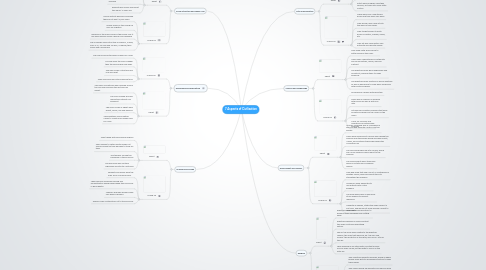
1. Social Structure and Family Life
1.1. Egypt
1.1.1. The social structure of the ancient Egypt is shaped like a pyramid. there are six levels to the pyramid: Pharaoh, Government officials, priests, scribes, artisans and finally peasants
1.1.2. parents sent there sons to other villages to learn about trading
1.1.3. the parents treasured children and and regarded them as a great blessing
1.1.4. peasant girls usually married at the age of 12 years old
1.2. Huang He
1.2.1. Human activity has been recorded there for at least 10,000 years.
1.2.2. People relied on the Huang He river for irrigation
1.2.3. Because of the many floods in the yellow river it has killed several million Chinese and Japanese
1.2.4. The Huang he social structure is Emperor, Si king, Xiao Si Tu, Jun Ren and Sui Ren, Ju Zhang, then slaves and commoners
2. Economy and Trade
2.1. Egypt
2.1.1. They traded with surrounding regions
2.1.2. They needed to obtain exotic goods not found in Egypt so they decided to trade for them
2.1.3. The temples formed the backbone of the economy
2.1.4. The economy was centrally organized and strictly controlled
2.2. Huang He
2.2.1. Peasants and slaves were the main force of manual labor
2.2.2. They had very advanced farming and domestication which helped keep their economy in good health
2.2.3. Jewelers and jade workers were very high in demand
2.2.4. Specific jobs contributed a lot to the economy
3. Geography and Agriculture
3.1. Huang He
3.1.1. The river floods often which is good for crops
3.1.2. In some areas the river is higher than the surrounding low lands
3.1.3. The main crops of that area are rice and millet
3.1.4. They used bone and stone farming tools
3.2. Egypt
3.2.1. The major civilizations were focused around the Nile river because the rest was dry desert
3.2.2. The river flooded annually depositing nutrient rich sediment
3.2.3. The major crops of Egypt were wheat, barley, flax and papyrus
3.2.4. The Egyptians used irrigation canals to create more usable land for crops
4. Arts and Education
4.1. Egypt
4.1.1. Their most major advances in art were made during the Old Kingdom
4.1.2. Highly educated scribes were granted estates by the Pharaoh
4.1.3. Scribes were generally part of the upper class
4.1.4. Artist were of higher class than farmers, but were still under state control
4.2. Huang He
4.2.1. There were only a few literary books and they were very basic
4.2.2. They would carve cave art into the walls of their caves
4.2.3. They taught scribes to write books of history, change, songs, etc.
4.2.4. Their art was made with a very entricate and delicate design
5. Science and Technology
5.1. Egypt
5.1.1. They used math and science to better improve their lives.
5.1.2. Had a basic understaning of arithmatic and could multiply, divide, add and subtract.
5.1.3. The Egyptians were good engenieers and Architects, allowing them to make pyramids.
5.1.4. The Egyptians were masters of human anatomy as well as being able to make basic medicines with plants and herbs.
5.2. Huang He
5.2.1. Developed a chinese writing system
5.2.2. There was an advance in working with bronze as well as with iron later
5.2.3. Astronomers created calendars that were acurate and based on the cycles of the moon
5.2.4. Coins for currency and chopsticks for eating were invented
6. Government and Leaders
6.1. Egypt
6.1.1. Lead by a Pharaoh who is considered a god and had absolute control over the people
6.1.2. There were government officials who helped the Pharaoh lead the people which included Priests, Viziers, and multiple others who helped the Civilization run
6.1.3. The land was divided up into Nomes, which are run by Governors who report to the Pharaoh
6.1.4. The Government was a theocracy which is a state run by religious figures
6.2. Huang He
6.2.1. They had kings that had a court, or a gathering of wealthy nobles, who preformed rituals to strengthen the kingdom
6.2.2. Governors were appointed to rule distant parts of the kingdom
6.2.3. The King would have a large army at his disposal to prevent rebellions
6.2.4. Mandate of heaven, stated the Gods support a just ruler, and would not allow anyone corrupt to hold power
7. Religion
7.1. Egypt
7.1.1. Egyptians developed mummification to preserve their deceased from rotting away.
7.1.2. Egyptians believed in Gods and that the Gods controlled everything natural.
7.1.3. Few of the Gods were related to the Egyptian religion, the ones that were are, Re- the son God, Anubis- the protector of the dead, and Horus- God of the sky.
7.1.4. They believed in life after death, and that a piece of your body call ka, left the body to live on in the after life.
7.2. Huang He
7.2.1. They practiced ancestor worship, which is where people offer gifts to deceased ancestors to keep them happy.
7.2.2. They would would ask ancestors for advice using oracle bones, which were bits of animal bone or turtle shell.
7.2.3. The King or someone high is power would have artists make bronze vests which were used in many religious rituals.
7.2.4. Most of the people practiced Buddhism which was the practice of reaching enlightenment and inner peace.
